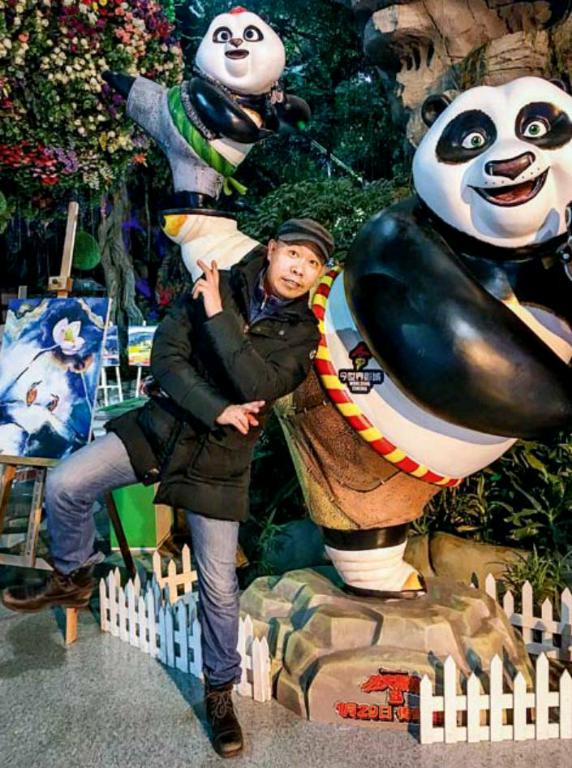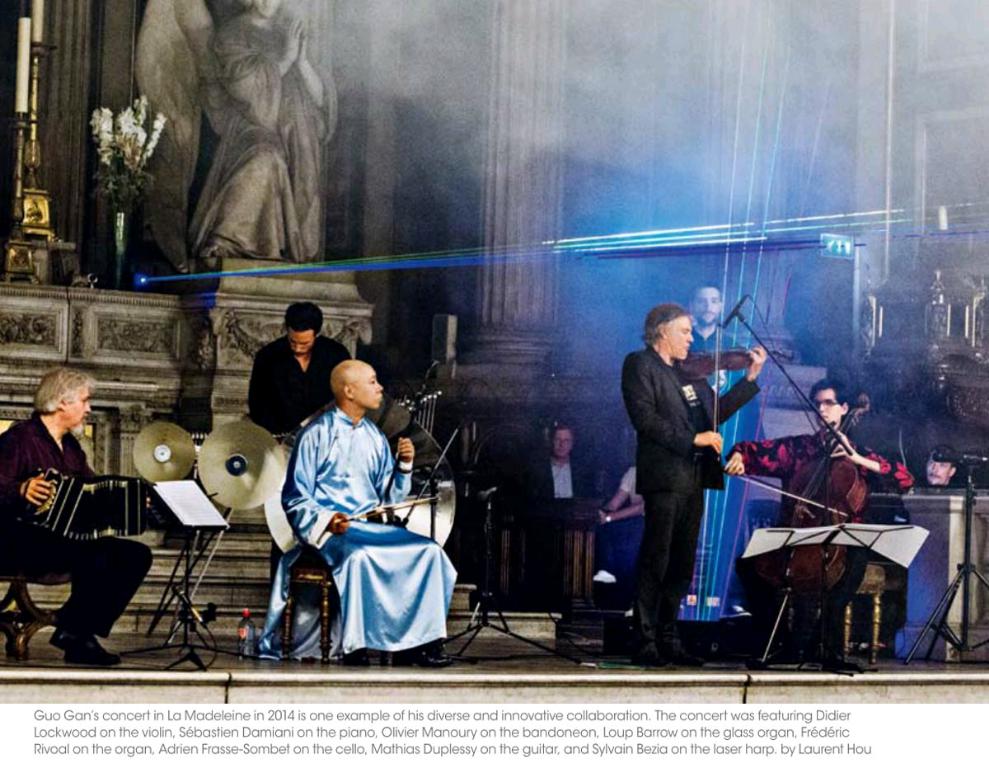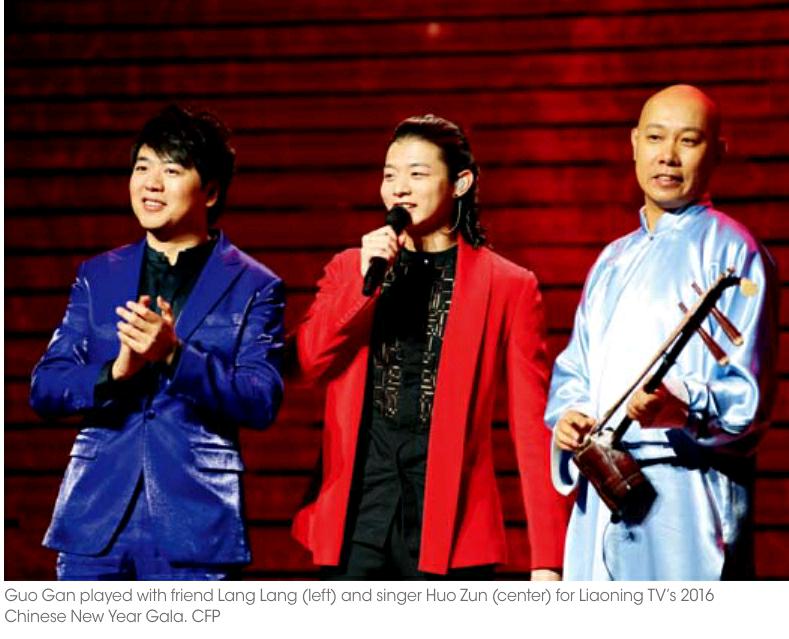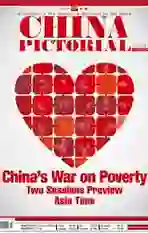Guo Gan:Bringing Erhu Music To the World
2016-03-17byLaurentHou
by+Laurent+Hou
The author first met erhu master Guo Gan in Beijing when he was playing for Croisements festival, during the celebration of the 50th anniversary of the establishment of diplomatic relations between China and France in 2014. In the West, the erhu is often called the “Chinese violin” or “Chinese twostring fiddle” and remains one of the most emblematic traditional Chinese instruments. Guo Gan was born in Shenyang, Liaoning Province, in 1968 and has been playing the erhu since the age of four. He has lived in France since 2001. In 2015, he was appointed “Chevalier de lOrdre des Arts et des Lettres,” a very prestigious title for those who make outstanding cultural accomplishments. Guo is a great ambassador of Chinese culture who plays the largest concert halls in Europe and the U.S. Recently, he contributed to the original soundtrack of the Sino-American movie Kung Fu Panda 3.
China Pictorial: You played the erhu, gaohu (a Chinese bowed string instrument) and zhonghu (a larger, lowerpitched version of the erhu) for Kung Fu Panda 3. What was that experience like? Guo Gan: I was really proud to contribute to such a big project. As a musician, I am always happy for the chance to play for a big audience. I think the music of Kung Fu Panda 3 is quite emotional, mirroring the story of the main character looking for his father. It was also very nice to cooperate with a great composer like Hans Zimmer. Regarding the process of recording the music, I have to confess it was not that special to me: There was no need for the composers, filmmakers or the other musicians to meet me in person. I just went to a very good studio and recorded my parts, and then everything was mixed together. Actually, I have been playing for movies since 2001, so you could say that I am rather familiar with the process.
CP: You were born in China but have lived in France since 2001, and you give concerts all around the world. What is it like to play the erhu outside of China?
Guo: In China, the erhu is something you can find everywhere. It is relatively popular but at the same time, there are expectations and limitations. Basically, if you play erhu in China, you are supposed to play traditional music and thats it. It is quite a small world. But when I arrived in France, everything was different. The erhu is something new and fresh, and people are curious about it. The French are quite interested in Chinese traditional culture, so many people were curious about me bringing Chinese music to Paris, and this curiosity inspired me too. Other musicians were very interested in me and my instrument, so I found many opportunities to play with great musicians from other genres and experiment a lot.
CP: Tell us more about the way you work with other musicians and how it made you evolve as an artist.
Guo: Playing other instruments when I was young and when I came to France has made me very open to collaboration with other musicians. As a kid I tried cello, violin and piano in addition to erhu, and when I went to France in 2001, I studied drums at the National School of Music in Paris, where there isnt an erhu major. In a city like Paris, I got connected to a very global musical universe. All this helped diversify my music and bestowed me the opportunity to bring erhu to many different genres. But when I experiment with the erhu in new genres, I always try to keep the instruments own identity and Chinese elements. To me, it is a dialogue between different types of music and instruments. In the end, they come together, but no instrument assimilates with others. I have played classical, baroque, Latin, jazz, blues, electronic, French pop and a bunch of different kinds of experimental music on the erhu.
CP: What were your most important collaborations?
Guo: Its hard to say because Ive had so many interesting ones, but a few that come to mind are Didier Lockwood, a French violinist who is also famous for experimenting with musical styles, French composer and pianist Yvan Cassar, and pianist Lang Lang (whose father studied erhu from Guo Gans father). This kind of collaborations on big projects with very accomplished artists is meaningful for my own development. And of course such work is quite important for my career. These projects bring access to big concert halls, good pay and high visibility. Making a living in France and supporting a family with only the erhu is quite challenging. It hasnt been easy convincing the top music schools to introduce a permanent erhu teaching position. And for those projects seeking an eclectic mix of instruments, I still face a lot of competition from many talented musicians of various genres and backgrounds living in Paris. It is really tough to be a full-time erhu player abroad. You have to play a lot of shows, persevere, and seize opportunities when they come. And one really needs a lot of enthusiasm and love for his art to do it.
CP: What do you think about music in China at the moment?
Guo: I think that we have some excellent musicians who manage to combine emotion and technique to play beautifully. Lang Lang is a good example. But unfortunately, I dont think we have really that many great artists. We have too many technicians. And this is largely due to our musical education system: In China, we are completely obsessed with technique, which is seen as the end rather than the means. Too often, music turns into a speed competition, and young musicians are chosen almost exclusively on technique and speed, not on their ability to communicate emotion. I also regret that we too often value traditional culture in a very superficial way. Musicians wear more and more extravagant so-called traditional clothes featuring vivid colors and embroidery everywhere but actually its getting more and more fake. And when some musicians try to do new things, they can be very clumsy or copy-paste recipes from the West that do not suit Chinese traditional music. For instance, there are now orchestras for traditional music. I am not opposed to this idea whatsoever: Large groups of musicians played together for the emperor. But instead of really researching Chinese musical history, some just copy a Western orchestra but with Chinese instruments replacing a Western counterpart. For instance, if a symphony orchestra has 30 violins, they say “so we have 30 erhus”and then apply the same logic to the other corresponding instruments. It doesnt make sense at all. From a technical point of view, the sound of Chinese instruments might be smaller or bigger than the instruments theyre replacing. And from a historical and cultural point of view, such an approach is pointless.
I hope China will continue cultivating its musical culture both with openness to other types of music and respect for its own culture. I also hope China will place more emphasis on emotion so we will see the emergence of more great Chinese artists than technicians.
